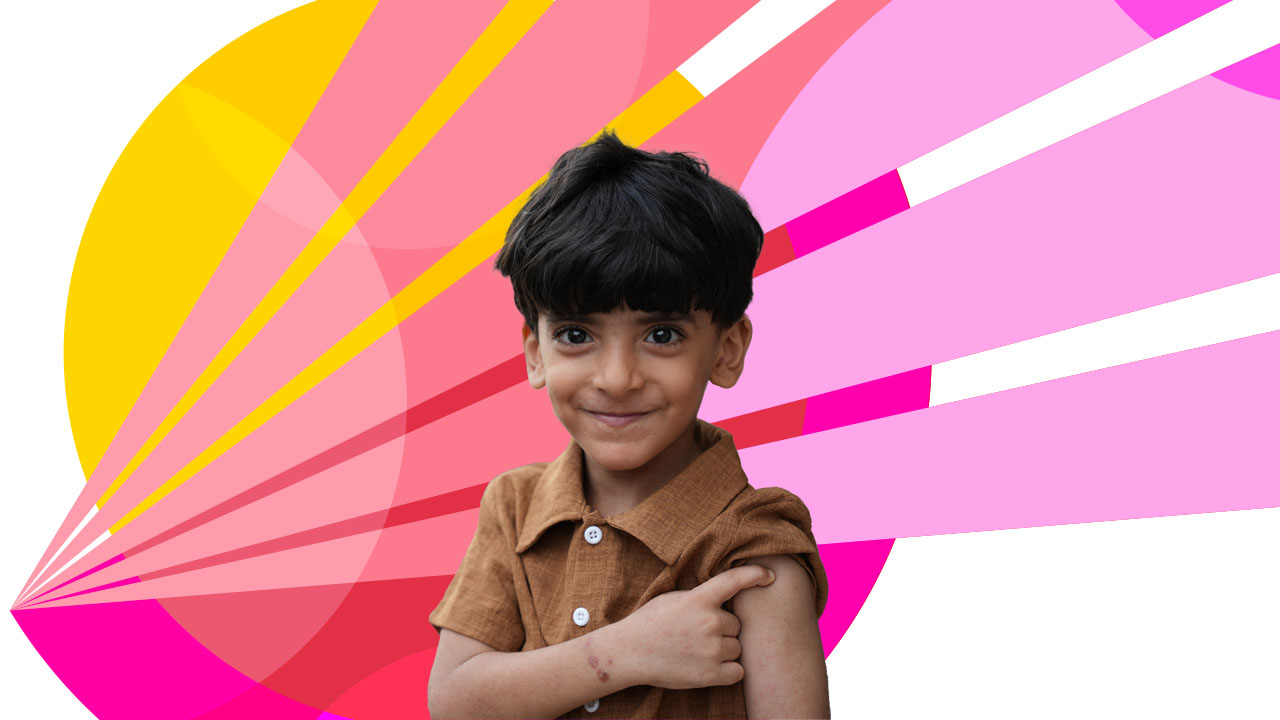
Have You Ever Celebrated the Contributions of Vaccinations In Your Life?

A young boy who has received a vaccine. Photo: #HumanlyPossible Campaign.
Sometimes we overlook the everyday tools that keep us safe and healthy. For many of us, it’s easy to overlook the impact of vaccination, which has saved and improved countless lives – including mine and the lives of my loved ones and likely including yours and your loved ones.
To understand the extent of their impact, let’s imagine a world without them. In such a world, millions of lives would be lost to common infectious diseases. Vaccination has allowed us to avoid these devastating consequences. By getting vaccinated, we are all part of this incredible story. We protect ourselves, and we protect others.
Every year, during World Immunization Week, we come together in a collective effort to celebrate and promote vaccination. This year, it is especially significant as it marks the 50th anniversary of the World Health Organization’s Expanded Program on Immunization (EPI).
On this occasion, we urge all governments and donors worldwide to prioritize and increase investment in vaccination. We would also like to express our gratitude to the dedicated individuals within the EPI and their partners around the world, as well as the tireless healthcare workers. It is essential that we recognize their invaluable contributions and provide them with the compensation they deserve.
EPI: A global immunization initiative
National EPI programs work in partnership with governments, health ministries, donors, and UNICEF procurement to distribute vaccines for routine immunization. The objective of the EPI is to ensure that vaccination services are easily accessible to caregivers and children. In the past 50 years, the EPI has made significant progress in this regard, achieving vaccination coverage rates more than eighty percent for certain diseases worldwide. With vaccines, it was possible to eradicate smallpox and to imagine that polio may be next. EPI vaccines prevent over four million deaths caused by vaccine-preventable diseases annually.
Vaccines against rotavirus, the most lethal cause of dehydrating diarrhea, is a major global health success story. More than 100 countries have introduced the vaccine into their EPI programs. In the communities where the rotavirus vaccine has been incorporated into their routine immunization schedules, they have seen dramatic reductions in rotavirus deaths and hospitalizations.
EPI makes health systems stronger
Every country in the world has established vaccine delivery systems, the result of massive global collaboration that includes donors, international NGOs, national governments, vaccine developers and manufacturers, healthcare providers, and communities.
Beyond the lifesaving impact of the vaccines themselves, the EPI strengthens health systems by improving vaccine supply chains, promoting community engagement and awareness of immunization, training health workers, and providing a platform through which to integrate additional health services or respond to disease outbreaks like cholera.
A place of trust
Caregivers from both remote villages and urban areas bring their children to EPI’s immunization and outreach centers to have them vaccinated. When EPI field health workers conduct home visits and local vaccine outreach centers invite nearby neighborhoods to get vaccines, it has a significant impact on communities. The trust in the safety and effectiveness of EPI’s vaccines is the program’s most valuable asset, which it has successfully built over the past 50 years. This trust allows the EPI to achieve impressive vaccination coverage and reduce the incidence of diseases. Between 2000 and 2019, it is estimated that immunization has prevented at least 37 million deaths. Thanks to immunization working alongside other health tools, the under-five mortality rate has decreased by over 50% since 1990.
Celebrate our collective efforts
Vaccines are powerful tools for protecting people and reducing the burden of vaccine-preventable diseases. However, vaccines alone cannot save lives if they are not used. It is not the vaccines that save lives, but rather the act of vaccination, which ensures that vaccines are made available to communities in need.
Vaccine scientists, manufacturers, donors, country policymakers, planners, managers, supervisors, vaccinators, volunteers, delivery personnel, healthcare workers, caregivers, and social mobilization workers collectively bring vaccines to communities. This allows millions of parents to watch their children take their first steps, stay in good health, be active, and embark on new experiences in their lives with less fear of contracting devastating diseases.
Each of us plays a part in making this happen. As we observe World Immunization Week, let us all celebrate our collective efforts in promoting vaccination. With a focus on equity and collaboration, we have high hopes that the EPI will continue to play a crucial role in primary healthcare systems for the next 50 years. We invite you to join us in this endeavor.


